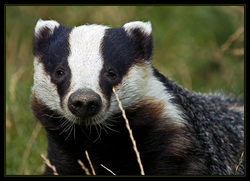\ˈba-jər\
I have discussed the origin of Arwulf’s name elsewhere, but my husband pointed out recently that I have yet to say anything about Grimbert. People are probably wondering, he said, seeing as how Grimbert the badger is much less well known than his companions Reynard the fox and Chanticleer the rooster.
Being a persistent fella, a couple days later he emailed me a raft of links to French folktales involving Grimbert—perhaps I could set the record straight? And write about badgers? Say, maybe “badger” could be a word of the week? Because if I hadn’t done the word of the week yet, “badger” would be a good choice. “Hector” is also a good word. But “badger” is better. If I hadn’t yet written a word of the week, I should really consider “badger”…
All right, already! I set out in dogged pursuit. And as so often happens I found that the burrow leads someplace rather unexpected.
The word “badger” in English originally did not refer to the animal: instead it meant a peddler or trader who sells grain. This might have been a person with a bag, or possibly a person with a badge (for example a license that allows the bearer to sell goods in a given marketplace). This activity was not always entirely ethical. Here’s the first entry in the OED, from the Statutes of Ireland in 1467:
| Diuersez aulters persouns appellez Baggeres ount vsez de aller a vne marchee & ount achatez..frument & blee a vne price et puis apres ount prisez lez ditz g[r]aynes a vne aulter marchee & illeosqes lez ount vendeuz pluis chierement par ii d. ou iii d. en vne Boshelle... |
As a result of their (shall we say) entrepreneurial enthusiasm, these mercantile badgers inspired a fair bit of hostility. They are frequently referred to as hucksters or swindlers. In 1592, the preacher William Cupper described them as an actual plague:
| Vserers, also brokers, badgers and hucksters, and such like locusts that eat vp the poore and cause the markets to be inhaunced should bee bridled to the ende the poore may haue things better cheape. (cited in James Davis’ Medieval Market Morality: Life, Law and Ethics in the English Marketplace 1200-1500) |
Making the leap from the locust-like trader of grain to the burrowing quadruped requires another form of speculation. While it is tempting to say that the animal was named for the peddler because it is similarly tenacious and combative, this is (alas) unlikely. The OED says that the name for the animal more likely derives from “badge” or “blaze” – a reference to the white stripes on a badger’s head. Others say that “badger” comes from the French “bêcheur” or “digger.”
| Whatever you call them, they are pretty cool creatures. They are closely related to weasels and otters and they live in burrows (called “setts”) that are often quite extensive and can be hundreds of years old. Mostly nocturnal, they eat rodents, eggs, fruit, grubs, small rabbits, bulbs, and whatever else they can find. And they are also reported to be quite clean: unlike many other underground creatures, badgers will not shit in their burrows, and instead use communal latrines outside. |
The “badgerer” could refer to the humans and dogs harrying the cornered animal—badger baiting was a popular sport through the early 20th century. In fact the Dachshund was bred as a badger hunter (the German “dachs” means “badger”). It's a little hard to imagine your average wiener dog taking on a desperate 30-pound creature equipped with sharp teeth and long claws, but there it is. The Brits started trying to ban badger baiting as early as 1835, though it stubbornly persists under the table even now.
On the other hand, it may be the badger itself that does the badgering. The animal is by nature peaceable but will fight fiercely when provoked. Some say that when it fights it will bite until its teeth meet and then hang on until its adversary gives up. (Ferrets and weasels are known to do this too—see, for instance the famous Annie Dillard essay, “Living Like Weasels,” which in turn inspired a Laurie Anderson song I like very much.)
This seems to jibe with the character of Grimbert. While Reynard is clever and unscrupulous, and Chanticleer is vainglorious and thin-skinned, Grimbert is honest, diligent, and very stubborn.
And it’s not just a “get out of my face and don’t bother me” kind of stubborn. At one point in the story, Reynard gets in hot water with the other animals and asks his nephew Grimbert to hear his confession. (I don’t know how a fox ends up uncle to a badger. It is a mystery.) Grimbert does so and grants absolution, only to see Reynard leap right back into sin at the sight of the next henhouse. You’d think he’d give up, but a few episodes later, the exact same thing happens again. Reynard asks Grimbert to shrive him of a lengthy catalogue of sins (including theft, adultery, and murder), Grimbert agrees, and again as soon as he is absolved Reynard goes right back to his old ways.
The author presumably wanted us to laugh at the folly of a priest who keeps on absolving sinners even when they have no intention of changing their ways. But I can’t help but admire Grimbert’s tenacity: all evidence to the contrary, he cannot let go of the possibility that maybe—just maybe—this time his uncle can be brought to the good. Faced with usury, swindling, or wanton cruelty, the badger keeps the faith. He keeps that shit out of the burrow.
He bites down hard and does not let go.


 RSS Feed
RSS Feed